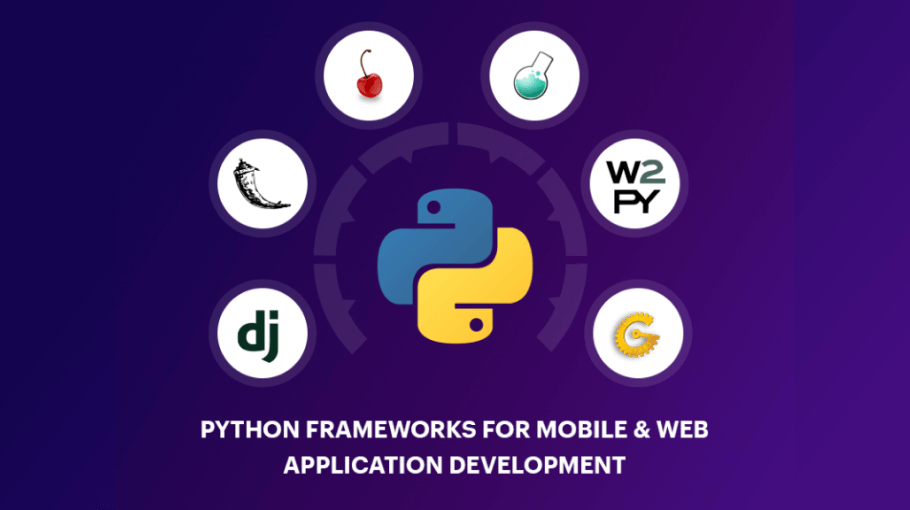Python is gaining popularity on the web as well as mobile app development due to its robust, powerful, interactive programming language that is easy to learn and reduces development time. Highly interactive, cross-platform support, object-oriented, open-source are some of the highlighting features of Python that lure developers to adapt it.
Python has a wide range of frameworks to offer to make things easier for developers. They are mainly categorized into,
- Full Stack Python Framework
- Non-Full Stack Python Framework
Out of the large pool of full stack and non-full stack python frameworks, here are some of the best Python frameworks popular among the developers.
Full Stack Python Frameworks
Full Stack Python Frameworks provide full support to the developers that include vital components such as template design, form validation, form generators, and many more. Some of the popular full-stack python frameworks are discussed below.
1. Django

Django is the most popular and one of the best Python framework known for the development of complex data-driven websites and web applications. It is an open-source framework loaded with libraries, templates, and APIs that allow developers to scalable applications. Django offers high efficiency and reusability of components thus reducing code complexity. Django has laid the base for giants such as Instagram, Pinterest, Washington Times, Mozilla, BitBucket, etc.
Features of Django:
- Highly Scalable
- Excellent Documentation
- Highly Secure
- Versatility
- Rapid Development
- Vast and Supported Community
2. TurboGears

TurboGears is a full-stack web application framework that comprises components such as SQLAlchemy, Repoze, WebOb, Genshi and many more to enlist. Being one of the best Python frameworks, TurboGears is an open-source and data-driven framework built around MVC architecture known for rapid web application development. TurboGears Python Framework is used by popular organizations such as ShowMedo, SourceForge, and Bisque.
Features of TurboGears:
- Web Server Gateway Interface (WSGI) components
- Microframework Solution
- Multiple Database Support
- Robust Object Relational Mapper (ORM) and Ajax
- Identification and Authentication
- Autogenerated Admin and CRUD
3. Web2py

Web2py is a free and open-source Python framework that comes with a code editor, debugger, and deployment tools. These tools allow the developers to code, test, compile, debug, and effectively manage web applications. Web2py is enlisted among the best Python frameworks due to a number of highlighting features and the one that tops the list is a cross-platform framework. The cross-platform framework allows support for Windows, Unix/Linux, Google App Engine, Mac, and many more.
Features of Web2py:
- MVC Architecture
- Ticket Framework
- Security against injection flaws, cross-site scripting, etc.
- Additional installation and configuration not required
- Supports role-based access control
- Built-in components to serve HTTP requests, HTTP responses, cookies, sessions and so on.
Non-Full Stack Python Frameworks
1. CherryPy

CherryPy is an open-source Python framework that is non-full stack and object-oriented. CherryPy is the only framework that allows the developers to incorporate create, retrieve, update, and delete (CRUD) functionalities in the applications. The applications developed on CherryPy can be run on all the Python-supporting operating systems such as Windows, Linux/Unix, Mac, etc.
Features of CherryPy:
- Built-in plugin systems
- Several HTTP servers can run simultaneously
- Tools for default events such as authorization, encoding, caching, etc.
- Built-in profiling, coverage and testing support
- Includes a thread pool web server, configuration framework, and a module framework
2. Flask

Flask is a micro-web Python framework that does not require any particular tools or libraries. This framework is based on the WSGI toolkit and Werkzeug Jinja2. Flask allows the developers to develop their own backup infrastructure in whichever way they need. Flask is used by many popular industry giants such as LinkedIn and Pinterest.
Features of Flask:
- Secure client-side sessions ensured
- Google App Engine compatible
- Unit testing support
- Built-in debugger and development server
- Includes RESTful request dispatching
3. Bottle

Bottle is one of the best Python frameworks that is generally used to build small web applications. Bottle is a WSGI microframework that is lightweight and makes web app development as simple as possible by including everything in one single file. This single document is enough to make you realize about its small size.
Features of Bottle:
- Easy access to file uploads, form data, cookies and HTTP related metadata
- Built-in HTTP server
- Request dispatching with URL support
- Key databases and support
- Plugin support for different databases
- Default adapters for WSGI/HTTP servers and third-party engines
Which is the best Python framework for you?
All the frameworks discussed in this article are potent and each one has its own pros and cons. The real task is to identify which is the best Python framework that suits their requirement aptly. To decide the framework for your requirement, you will need experts to steer you out from the pool of dilemma. Well, Openxcell is here for you with the team of best Python developers in the industry. Get a tailored solution for Python app development with Openxcell today!








